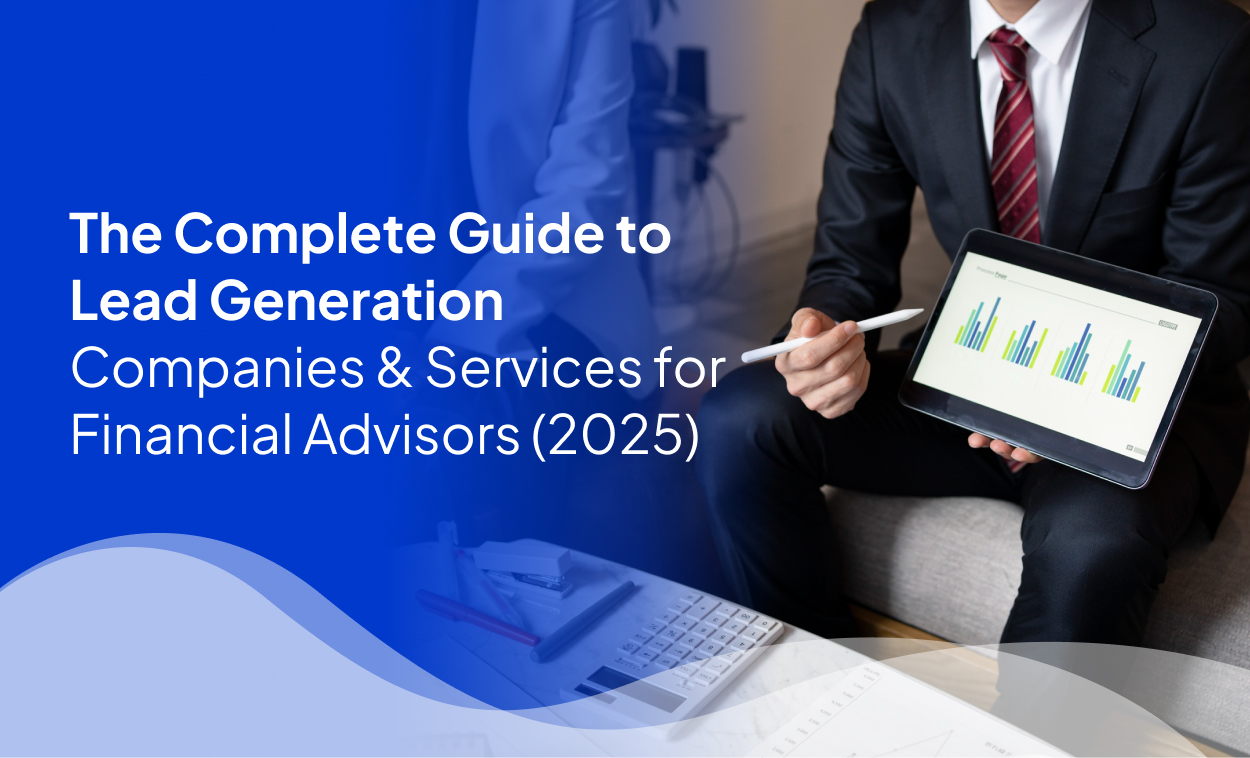
- Written & Reviewed by Jeremy
- Published
- Last Updated Sep 09, 2025
In today’s competitive financial services landscape, having an impressive track record isn’t enough you also need to be visible where prospects are searching: online. That’s where Search Engine Optimization (SEO) for financial advisors comes in.
SEO is the process of optimizing your website so that when potential clients type in queries like “best retirement planner near me” or “how to reduce taxes in retirement,” your firm shows up at the top of Google. Done right, SEO can help you build trust, attract qualified leads, and grow your book of business without relying solely on referrals.
In this guide, we’ll break down everything financial advisors need to know about SEO from keyword research to content marketing, local search, backlinks, and beyond so you can stay ahead in 2025.
What Is SEO?
SEO, or search engine optimization, refers to the strategies used to improve a website’s visibility in search engine results. Search engines rank websites based on many factors, and the higher your site ranks, the easier it is for people to find you online.
For financial advisors, SEO is especially important. When someone searches for terms like “financial advisor near me” or “retirement planning help,” you want your business to show up at the top. Strong SEO not only makes you easier to find but also gives you a competitive edge by outranking other advisors in your area or niche.
SEO also builds credibility. When other reputable sites link to your website, it signals authority to search engines and potential clients alike. This can improve your domain authority, helping you climb even higher in search rankings. And it doesn’t stop at Google SEO also applies to social media. Optimizing your posts and videos increases the chances of being discovered by your target audience on the platforms they use.
Why SEO Matters for Financial Advisors
For example, platforms like Revenx Digital Marketing For Financial Advisors Platform can help bridge the gap by offering client lead generation, automated marketing tools, and time-saving solutions that allow advisors to focus on building relationships while still attracting new prospects.
How SEO Works for Financial Advisors
At its core, SEO for financial advisors means optimizing your online presence to show up when people search for financial services in your area. Here’s a breakdown of the key steps:
Keyword Research
- Identify the terms potential clients use, such as “investment management,” “financial advisor near me,” or “retirement planning.”
- Use tools like Google Keyword Planner to find high-volume, low-competition keywords that can drive targeted traffic.
On-Page Optimization
- Incorporate chosen keywords naturally into your website’s titles, headers, meta descriptions, and page content.
- Make sure your website loads quickly and is mobile-friendly both are key ranking factors.
- Publish high-quality, informative content that answers client questions and highlights your expertise.
Local SEO
- Since many clients look for advisors nearby, optimizing for local searches is crucial.
- Claim and optimize your Google Business Profile with accurate information and photos.
- Encourage satisfied clients to leave reviews, and use location-based keywords in your site’s content.
Link Building
Earn backlinks from respected websites in the financial industry. These act as endorsements in the eyes of search engines, improving your authority and ranking.
Content Marketing
- Write blogs, articles, and guides that address common client concerns.
- Share your content across social media and professional platforms to boost visibility and attract more visitors.
Step 1: Keyword Research for Financial Advisors
Ongoing Optimization
SEO isn’t one-and-done. Monitor your rankings regularly, analyze your website’s performance, and update content as needed to stay ahead of competitors.
Also read – digital marketing for financial advisor

SEO isn’t one-and-done. Monitor your rankings regularly, analyze your website’s performance, and update content as needed to stay ahead of competitors.
Also read – digital marketing for financial advisor
The foundation of SEO is understanding what your potential clients are searching for. This is where keyword research comes in.
Types of Keywords Advisors Should Target
1. Transactional Keywords – Indicate high intent to hire.
- Example: “best financial advisor in Dallas”
- Example: “fiduciary retirement planner near me”
2. Informational Keywords – Show interest in learning before deciding.
- Example: “How much should I save for retirement at 50?”
- Example: “FERS vs CSRS retirement plan”
3. Branded Keywords – For people looking for your firm specifically.
Tools for Keyword Research
- Google Keyword Planner – Free and reliable starting point.
- SEMrush or Ahrefs – Advanced tools showing keyword difficulty and competitors.
- AnswerThePublic – Reveals common questions prospects are asking.
Pro tip: Focus on long-tail keywords like “retirement planner for federal employees in Oklahoma” instead of just “retirement planner.” These are easier to rank for and attract highly qualified leads.
Step 2: On-Page SEO Optimization

Once you’ve identified the right keywords, you need to optimize your website pages. This ensures search engines understand your content and clients find it easy to navigate.
1. Meta Title & Description – The first thing prospects see in Google search.
- Example: “Top Financial Advisor in Oklahoma | Retirement & Wealth Planning Experts”
- Description: “Looking for a fiduciary financial advisor? We help professionals and retirees in Oklahoma build wealth, reduce taxes, and retire confidently.”
2. Headings (H1, H2, H3) – Break down your content into skimmable sections.
3. Internal Linking – Link related pages (e.g., “retirement planning” blog → “contact us” page).
4. Page Speed & Mobile Friendliness – Google rewards websites that load fast and look good on mobile.
Step 3: Local SEO for Financial Advisors

Since most clients prefer to work with someone nearby, local SEO is one of the most important areas for financial advisors.
Key Local SEO Strategies
- Google Business Profile (GBP) – Claim and optimize your profile with accurate NAP (Name, Address, Phone). Add photos, services, and regular updates.
- Reviews & Testimonials – Encourage satisfied clients to leave Google reviews. More reviews = more trust + higher rankings.
- Local Listings – Ensure your firm is listed consistently on Yelp, Better Business Bureau, and financial advisor directories.
- Location Pages – If you serve multiple areas, create dedicated pages (e.g., “Financial Advisor in Tulsa” and “Financial Advisor in Oklahoma City”).
Google’s algorithm heavily favors businesses with verified locations, strong reviews, and consistent listings.
Step 4: Content Marketing for Financial Advisors

SEO without content is like a car without fuel. To attract and engage potential clients, you need a steady stream of valuable content.
Types of Content That Work Best
Educational Blog Posts
- Example: “How to Minimize Taxes in Retirement”
- Example: “FERS vs CSRS: Which Plan Benefits You More?”
Guides & eBooks
Interactive Tools
Videos & Webinars
Pro tip: Create evergreen content (topics that stay relevant) while also covering timely updates (e.g., “2025 IRS Contribution Limits”).
Step 5: Building Authority with Backlinks

How Financial Advisors Can Get Backlinks
- Guest Posting – Write for financial blogs or local news sites.
- Partnerships – Collaborate with CPAs, attorneys, or chambers of commerce.
- Directories – Get listed on professional associations like NAPFA, CFP Board, or local business directories.
- PR Features – Share expert insights in publications like Forbes, Investopedia, or Financial Planning Magazine.
Even a few high-quality backlinks can make a huge difference in rankings.
Step 6: Technical SEO Essentials

While keywords and content matter most, don’t overlook the technical side of SEO:
- Mobile-first indexing – Most searches happen on smartphones.
- Secure website (HTTPS) – Clients want to know their data is safe.
- Site speed optimization – Slow websites lose visitors.
- Structured data markup – Helps Google understand your services (e.g., “financial planning,” “retirement advisor”).
Climbing search rankings doesn’t just happen it takes consistent, targeted effort. That’s why our SEO for financial planners approach goes beyond keywords. At Revenx, we optimize everything from financial advisor website design to local search visibility and high-converting landing pages. Pairing SEO with smart PPC for financial advisors allows you to capture both organic and paid search traffic, ensuring you’re found first whether clients are ready to learn or ready to book.
SEO Best Practices for 2025 (New Trends)
SEO is constantly evolving. Here are some 2025-specific updates:
- EEAT (Experience, Expertise, Authoritativeness, Trustworthiness) – Google favors content by real experts. Make sure your credentials (CFP®, fiduciary, etc.) are visible.
- AI Search (Google SGE) – Short, direct answers may replace some search results. Advisors need to answer questions clearly to appear in AI snippets.
- Voice Search – Optimize for conversational queries like “Who is the best fiduciary advisor near me?”
- Video SEO – YouTube is the world’s second-largest search engine leverage it.
Final Thoughts
SEO for financial advisors isn’t just about ranking on Google it’s about building credibility, trust, and authority in a digital-first world. By combining keyword research, local SEO, content marketing, backlinks, and technical optimization, you can attract high-quality leads consistently.
With competition intensifying in 2025, now is the time to invest in SEO as a sustainable growth channel.






